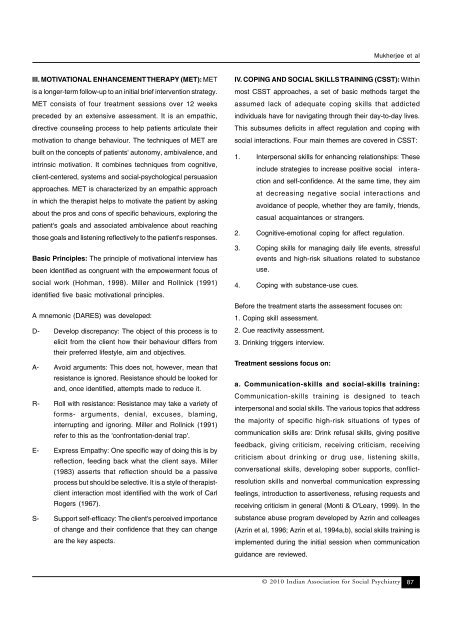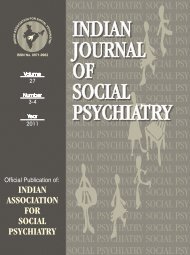IJSP-2010(3-4) - Indian Association For Social Psychiatry
IJSP-2010(3-4) - Indian Association For Social Psychiatry
IJSP-2010(3-4) - Indian Association For Social Psychiatry
You also want an ePaper? Increase the reach of your titles
YUMPU automatically turns print PDFs into web optimized ePapers that Google loves.
III. MOTIVATIONAL ENHANCEMENT THERAPY (MET): MET<br />
is a longer-term follow-up to an initial brief intervention strategy.<br />
MET consists of four treatment sessions over 12 weeks<br />
preceded by an extensive assessment. It is an empathic,<br />
directive counseling process to help patients articulate their<br />
motivation to change behaviour. The techniques of MET are<br />
built on the concepts of patients' autonomy, ambivalence, and<br />
intrinsic motivation. It combines techniques from cognitive,<br />
client-centered, systems and social-psychological persuasion<br />
approaches. MET is characterized by an empathic approach<br />
in which the therapist helps to motivate the patient by asking<br />
about the pros and cons of specific behaviours, exploring the<br />
patient's goals and associated ambivalence about reaching<br />
those goals and listening reflectively to the patient's responses.<br />
Basic Principles: The principle of motivational interview has<br />
been identified as congruent with the empowerment focus of<br />
social work (Hohman, 1998). Miller and Rollnick (1991)<br />
identified five basic motivational principles.<br />
A mnemonic (DARES) was developed:<br />
D- Develop discrepancy: The object of this process is to<br />
elicit from the client how their behaviour differs from<br />
their preferred lifestyle, aim and objectives.<br />
A- Avoid arguments: This does not, however, mean that<br />
resistance is ignored. Resistance should be looked for<br />
and, once identified, attempts made to reduce it.<br />
R- Roll with resistance: Resistance may take a variety of<br />
forms- arguments, denial, excuses, blaming,<br />
interrupting and ignoring. Miller and Rollnick (1991)<br />
refer to this as the 'confrontation-denial trap'.<br />
E- Express Empathy: One specific way of doing this is by<br />
reflection, feeding back what the client says. Miller<br />
(1983) asserts that reflection should be a passive<br />
process but should be selective. It is a style of therapistclient<br />
interaction most identified with the work of Carl<br />
Rogers (1967).<br />
S- Support self-efficacy: The client's perceived importance<br />
of change and their confidence that they can change<br />
are the key aspects.<br />
Mukherjee et al<br />
IV. COPING AND SOCIAL SKILLS TRAINING (CSST): Within<br />
most CSST approaches, a set of basic methods target the<br />
assumed lack of adequate coping skills that addicted<br />
individuals have for navigating through their day-to-day lives.<br />
This subsumes deficits in affect regulation and coping with<br />
social interactions. Four main themes are covered in CSST:<br />
1. Interpersonal skills for enhancing relationships: These<br />
include strategies to increase positive social interaction<br />
and self-confidence. At the same time, they aim<br />
at decreasing negative social interactions and<br />
avoidance of people, whether they are family, friends,<br />
casual acquaintances or strangers.<br />
2. Cognitive-emotional coping for affect regulation.<br />
3. Coping skills for managing daily life events, stressful<br />
events and high-risk situations related to substance<br />
use.<br />
4. Coping with substance-use cues.<br />
Before the treatment starts the assessment focuses on:<br />
1. Coping skill assessment.<br />
2. Cue reactivity assessment.<br />
3. Drinking triggers interview.<br />
Treatment sessions focus on:<br />
a. Communication-skills and social-skills training:<br />
Communication-skills training is designed to teach<br />
interpersonal and social skills. The various topics that address<br />
the majority of specific high-risk situations of types of<br />
communication skills are: Drink refusal skills, giving positive<br />
feedback, giving criticism, receiving criticism, receiving<br />
criticism about drinking or drug use, listening skills,<br />
conversational skills, developing sober supports, conflictresolution<br />
skills and nonverbal communication expressing<br />
feelings, introduction to assertiveness, refusing requests and<br />
receiving criticism in general (Monti & O'Leary, 1999). In the<br />
substance abuse program developed by Azrin and colleages<br />
(Azrin et al, 1996; Azrin et al, 1994a,b), social skills training is<br />
implemented during the initial session when communication<br />
guidance are reviewed.<br />
© <strong>2010</strong> <strong>Indian</strong> <strong>Association</strong> for <strong>Social</strong> <strong>Psychiatry</strong><br />
87



